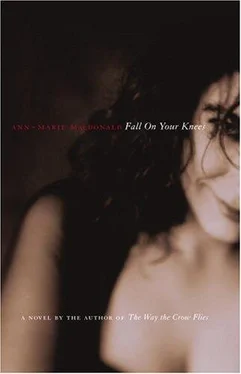Again. Oh no. Lily stands with parted lips and puckered forehead. Oh no, oh no, oh no.
“Okay, Lily. I’ll tell you” — Lily can’t remember what Frances is talking about — “but you have to swear.”
Lily just stands there.
“Don’t worry, Lily, we’ll clean it all up.”
“But some things are broken.”
“We’ll fix them, don’t worry. Swear.”
“I swear.”
“You have to swear on something.”
“Um … on Raggedy-Lily-of-the-Valley.”
This makes Lily feel teary because she imagines how she’d feel if someone came along and did to Raggedy-Lily-of-the-Valley what she has just done to The Old-Fashioned Girl. Raggedy-Lily-of-the-Valley with her head off. Little bits of grey material coming out. But Frances has other stakes in mind.
“Swear on your bootleg.”
“On my little leg.”
“May it be cut off if you speak of this again.”
Lily looks down at her legs: the strong right one, and the wispy left one. In its sincere beige wool stocking, which sags like empty skin within the steel harness; its high narrow shoe with the mild horse’s face, the iron bit clamped under the sole. Her heel is much better now, there’s just a scab from Armistice Day.
“Okay,” says Lily. Don’t worry, little leg, I’ll keep my vow.
“Okay. Well. Mumma went crazy from shame of what she did with the man from The Coke Ovens. Plus she was dying of a wound she got because Daddy had to cut you and Ambrose out of her stomach with his bayonet.” Make yourself cosy, now. “It was the middle of the night. Daddy left her sleeping and went to get the doctor. But she got up even though she was cut open.” Frances has slipped into the eerie voice of the stray-orange-cat story. It’s the voice she uses when she is telling the truth. “I was at my bedroom window wearing my tartan housecoat. I saw Mumma down in the creek. Ambrose was lying on the bottom. She was just about to do the same thing to you. But she looked up and she saw me watching her so she stopped. There was a bright bright moon and I just looked her in the eye like that till Daddy came and dragged her back to the house with you. Then she died.”
“Poor Mumma,” Lily weeps.
Frances blinks, finally. “Poor Mumma? She tried to kill you, you idiot, I’m the one who saved you.”
“Why didn’t you save Mumma?”
“No one could save Mumma.”
“You saved me.”
“Yes, you dunce, I saved you.”
“Thank you, Frances.” Lily hugs Frances. “Does Daddy know?”
“That I saved you? Yes.”
“Does he know he’s not my real daddy?”
“Yes, but you can never mention it, Lily, it would really hurt him. ’Cause even though you’re not his, he loves you more than the rest of us.”
“He loves you too, Frances.”
“Yes, but he loves you the most.”
“I want him to love you the most too.”
“It’s all right, Lily, it’s supposed to be this way.”
“I love you the most, Frances.”
“What about Daddy and Mercedes?”
“I love them the most too.”
“There’s no such thing as loving everyone the most.”
Mercedes spent the morning at New Waterford General Hospital. She read aloud to a veteran who had been gassed in the war, emptied bedpans, changed the water in vases and generally made herself useful. She’d have brought Lily, but Daddy wants to make sure Lily’s foot is completely healed before she ventures out. After the hospital, Mercedes went to Mount Carmel Church and helped the nuns polish the communion rail and dust the altar. She lit a candle, knelt at the base of the beautiful eight-foot Mary and said a few prayers for Mumma and Kathleen and Valentino and all the poor captive souls in purgatory.
Valentino died three years ago. The day she heard the impossible news it was all Mercedes could do to keep from running to Helen Frye’s house. She found the strength to forbear. It’s simple, really: just don’t move, and you won’t do anything you’ll regret later. Mercedes spent that day sitting, enervated, on the edge of her bed, staring at Valentino’s picture. When she got up, it was to replace his face in the frame with a poem she had come across in Reader’s Digest called “Don’t Whine”.
Mercedes always crosses the street when she sees Helen Frye. Helen looks wistfully at Mercedes, although she has given up saying hello. The Fryes must know by now how wrong they were, no doubt Helen has shed her share of hot tears. Good enough for them. Mercedes hasn’t wasted time on silly girlfriends since Frye. She has been too busy with school and family. Here is the order of priorities: God, family, school, piano, friends.
Mercedes will soon turn seventeen — November is the one month when she and Frances are the same age. Mercedes is in her final year of high school. She is a definite for a scholarship to St Frances Xavier University on the mainland. Surely Daddy will be able to spare her by then. She tries not to be selfish about it, but she wants so badly to go to university. It’s too late for her other ambition: to be the best student ever to grace the halls of Holy Angels. She has settled for being the best Mount Carmel has ever seen, and among the best in the province. All this and cooking and cleaning and babysitting too. Mercedes tries not to be proud — only grateful. Think of how many girls never even get to finish high school. Think of the poor children who share a single pair of shoes among a whole family.
Mercedes leaves the church, raises her umbrella and walks down Plummer Avenue through the steady drizzle, nodding polite greetings left and right. Despite her youth, many people call her “Miss Piper”. It seems natural. Partly because of her bearing and good works. Partly because of her grooming. She is swathed in tweed, crisp in a white blouse and black necktie, gloved, with a straw boater angled on her pale bun. She never fails to wear a hat and gloves, not just out of seemliness but because, summer or winter, she darkens rather too readily. In Paris, Coco Chanel has just invented the suntan, but word hasn’t reached New Waterford. Beneath it all, Mercedes is decently corseted and petticoated. Frances has told her she looks as though she just stepped out of the Time Machine. But good taste is always in style. Truly, civilization is a thin veneer. For what have we to distinguish us from the beasts of the field? Besides, of course, an immortal soul? Manners, and suitable attire.
One effect of cultivating the virtue of charity is the realization that the Mahmouds over in Sydney require her prayers. So along with the dead, Mercedes prays for her unknown relatives. She is praying for them now, inwardly, as she passes the new gasoline pumps and nods to Mr MacIsaac. It slipped her mind in church, but there is no such thing as an inconvenient moment when it comes to prayer. That’s the marvellous thing about it. “Please, dear God, don’t judge too harshly Your servants in Sydney who cast out their own flesh and blood. Amen.”
Although Mercedes was too young to respond mercifully to the first twenty-five years of disaster, she has been working hard to make up for it. And there’s plenty of time; this is, after all, only 1929. In the grievously wounded but still young twentieth century, Mercedes finishes her prayer with a discreet sign of the cross etched with her index finger upon her thumb and turns into Luvovitz’s Kosher Canadian to buy a roast for Sunday’s supper.
Luvovitz’s Delikatessen has expanded to include fruits, vegetables, tinned goods, dry goods, and bins of bulk comestibles, because few people can afford to buy meat on a regular basis.
The bell rings as Mercedes opens the door, and Ralph Luvovitz looks up from behind the counter. The tips of his adorable sticking-out ears turn as red as the stripes in his apron when he sees her. Mercedes looks as young as she is the moment she smiles at him. They exchange pleasantries, avoiding and catching one another’s eyes, as he draws out the process of measuring and cutting brown paper, unwinding a length of string, selecting just the right roast, wrapping it and tying it up. At the end of the process it seems to slip his mind that Mercedes is waiting for him to hand the package to her. Neither does Mercedes remind him.
Читать дальше












